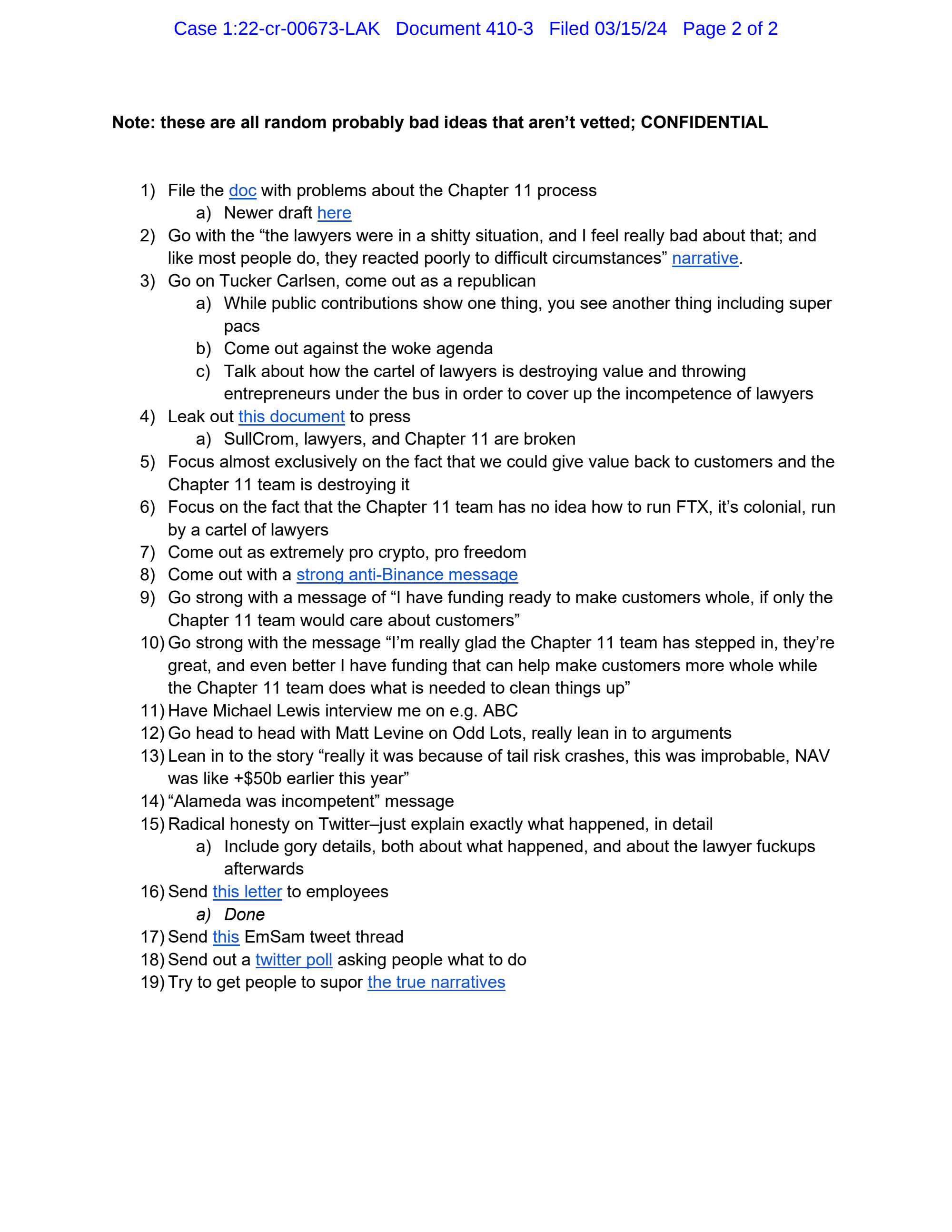- Sam Bankman-Fried came up with a list of ideas he called "probably bad" after FTX's bankruptcy.
- One of them was going on Tucker Carlson's show and taking an anti-woke heel turn.
- The list was in prosecutors' sentencing submission, which asks for up to 50 years in prison.
After FTX declared bankruptcy in November 2022, its founder and former CEO came up with a list of terrible ideas.
In a Google Doc, which was prefaced "random probably bad ideas" and labeled confidential, Sam Bankman-Fried listed ways in which he might be able to rebuild his reputation.
The list included attacking the bankruptcy lawyers (which he ultimately did), slamming the rival cryptocurrency exchange Binance (ditto), and doing an ABC News interview with the author Michael Lewis (Lewis does not work for ABC).
Perhaps the most striking item on the list was going on the then-Fox News host Tucker Carlson's show to "come out as a republican."
On Carlson's show, Bankman-Fried could "come out against the woke agenda" and criticize the bankruptcy lawyers who took over FTX and were trying to get money back to defrauded customers, he wrote on the list.
"Talk about how the cartel of lawyers is destroying value and throwing entrepreneurs under the bus in order to cover up the incompetence of lawyers," Bankman-Fried said.
A copy of the document was included as an exhibit in a sentencing memorandum federal prosecutors in Manhattan filed Friday.
In November, a jury found Bankman-Fried guilty of seven counts of fraud and conspiracy. Numerous former executives and associates testified that Bankman-Fried commingled funds of FTX customers with Alameda Research, a cryptocurrency trading firm he also controlled. The losses, prosecutors say, exceeded $10 billion.
Prosecutors are asking a judge to sentence Bankman-Fried to between 40 and 50 years in prison and issue an $11 billion judgment. They've said the notorious Ponzi schemer Bernie Madoff's crimes should be used as a benchmark for Bankman-Fried, whose fraud they call "one of the largest financial frauds in history, and what is likely the largest fraud in the last decade."
Prosecutors say that the list of ideas is evidence Bankman-Fried was "motivated to launch his redemption narrative and has already been thinking about how to spin it" — and that he should therefore get a long prison sentence.
US District Judge Lewis Kaplan is set to weigh prosecutors' memo against one by Bankman-Fried's lawyers, who asked for a sentence of no more than about six years.
Bankman-Fried himself said his list of ideas was not very good.
"Note: these are all random probably bad ideas that aren't vetted," the document says at the top.
Bankman-Fried never ended up on Carlson's show, which was canceled by Fox News in 2023. (Carlson has since switched to vlogging on X and launched his own subscription product.)
Some of the ideas came to fruition, though.
Bankman-Fried and his family have long argued that FTX customers would have speedily recovered their money if bankruptcy lawyers had cooperated with him.
"Focus almost exclusively on the fact that we could give value back to customers and the Chapter 11 team is destroying it," Bankman-Fried wrote in one list entry.
"Focus on the fact that the Chapter 11 team has no idea how to run FTX, it's colonial, run by a cartel of lawyers," he wrote in another.
"Come out as extremely pro crypto, pro freedom," he added.
In another list, he tried to think of people whom he could court for support.
He listed "alt right?" and "some other displaced group?" under the category of "random subgroup support."
In a bankruptcy court hearing earlier this year, FTX lawyers said customers could be made whole — something that Bankman-Fried's lawyers have cited to argue for a light sentence.
But prosecutors say that claim doesn't tell the full story. It doesn't account for the work that FTX lawyers put into liquidating and clawing back various investments Bankman-Fried made with customer money, they write.
Owners of bitcoin on FTX's platform wouldn't be able to take advantage of the rise in the cryptocurrency's prices because Bankman-Fried had already spent it, they say. Instead, they'd get the November 2022 dollar amount for those currencies — far less than what they would be worth today.
Bankman-Fried, in his list, seemed cognizant of his political reputation. He donated primarily to Democrats in congressional races. But, according to trial testimony and messages obtained by prosecutors, he participated in a straw donor scheme where he'd funnel FTX customer funds through other executives to Republicans and right-leaning dark money groups.
Bankman-Fried wrote that he could highlight that aspect of his political spending on Carlson's show.
"While public contributions show one thing, you see another thing including super pacs," he wrote.
In another list, Bankman-Fried came up with a list of "allies."
The only person on that list is "Skreli," an apparent reference to Martin Shkreli.
Bankman-Fried mused about politicians and reporters who "might be helpful" to him, including Sen. Cory Booker of New Jersey, Lewis, and the Bloomberg columnist Matt Levine.
It was on Bloomberg's "Odd Lots" podcast where Levine famously described Bankman-Fried's thoughts on cryptocurrency as "the Ponzi business."
Bankman-Fried seemed to think he could give it another shot.
"Go head to head with Matt Levine on Odd Lots, really lean in to arguments," he wrote.

